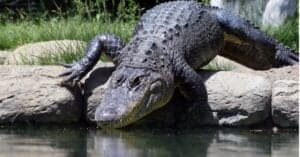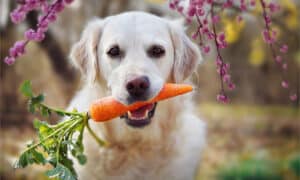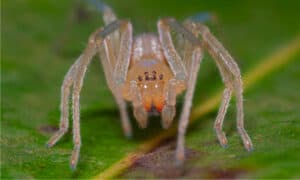The 10 Best Farm Animals
When you’re creating a farm, you need to know about the most useful animals for that environment. Whether you’re looking for livestock or companion animals, there are many possibilities – for beginners, low maintenance, for self-sufficiency, for pets, to raise for profit or miniature animals for a backyard. Here are the 10 best farm animals around, with many being the most common.
Goats
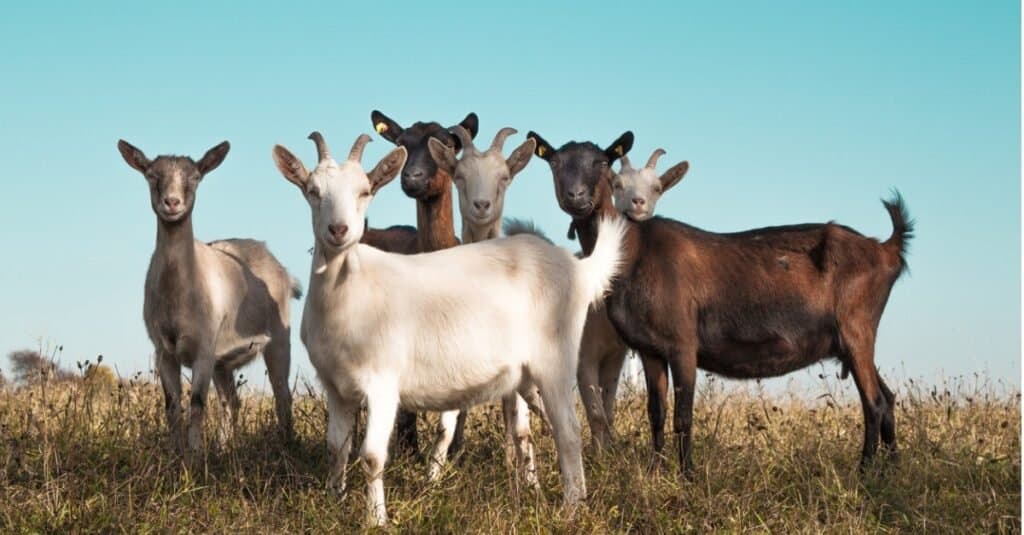
iStock.com/aurorat
One of the best Farm animals to raise for self-sufficiency and for profit is goats. They are useful for meat, dairy, fiber, and clearing brush. Some people prefer goat dairy to cow dairy and it has its own unique health benefits, such as being easier to digest, especially for lactose-intolerant people. They need to eat feed, hay, shrubbery, and vegetables but are also happy to get rid of kitchen scraps. You need to provide them shelter, goat fencing, and have at least one other goat for companionship and to deter them from escaping.
They are not very low maintenance, however, as they are vulnerable to illness, stomach problems, and worms. If you have a small backyard or only a few acres of land, look into miniature breeds such as pygmy goats, useful for both meat and milk, or Nigerian dwarf goats, which are useful for milk and also most common for pets. Nigerian dwarf goats can produce 1/2 to 1 gallon of milk a day. There are goat breeds that are naturally hornless if you don’t want to dehorn them.
Ducks
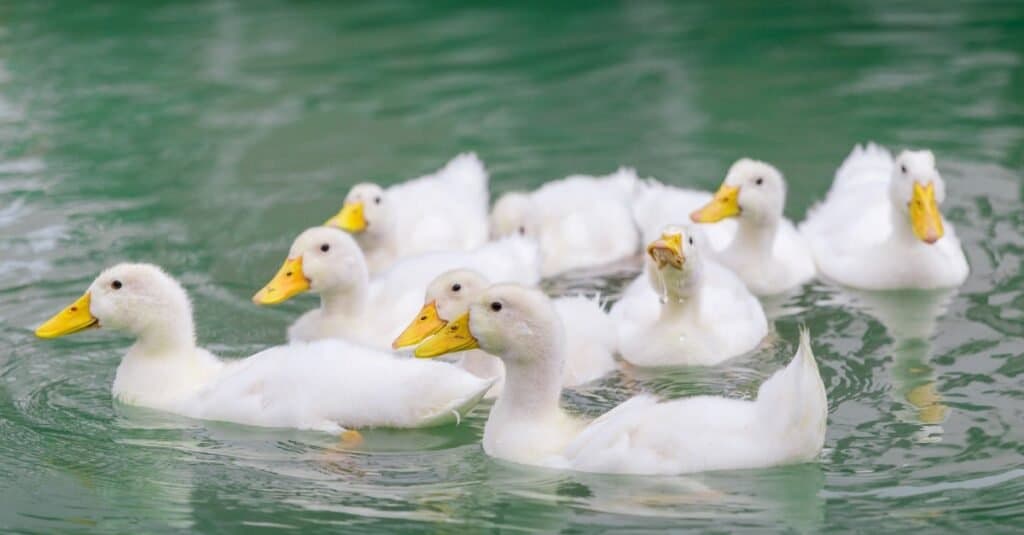
iStock.com/kunchainub
The most low-maintenance Farm animals to raise are ducks, which don’t need much space compared to others. They are excellent to raise for self-sufficiency or for profit, even for beginners. Not only are they useful for meat if you enjoy duck, but the hens lay an average of 200-300 extra-large eggs a year starting at five to six months of age. Many people prefer duck eggs over chicken eggs for baking.
These foragers only need a house, a kiddie pool, and proper fencing, and even serve to help around in the garden by eating pests and weak-rooted plants. They also eat snails, worms, aquatic plants and bugs, fish and fish eggs, grains, and seeds, They’re great for pets, too. One caveat is that they are more territorial than chickens and each needs 4-6 feet of space in their house and 10-15 feet to roam in a duck run. The Pekin breed is an all-white duck that is valued for both eggs and meat, and it produces 90% of all duck meat.
Cows
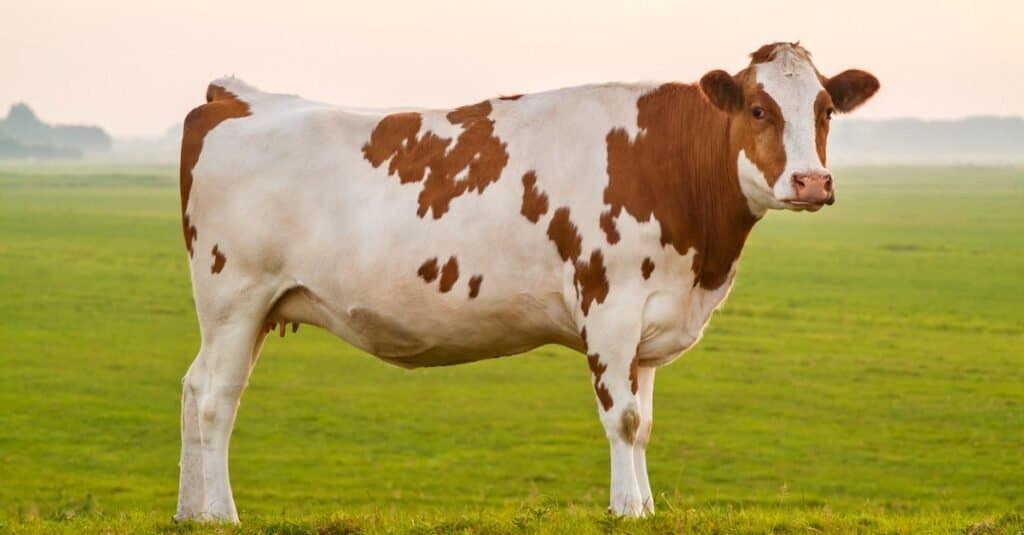
iStock.com/DutchScenery
When it comes to raising livestock for profit or for self-sufficiency, you can’t do better than cows. You can sell calves once they’re weaned, or wait until they’re grown and sell them for meat and milk cows to produce and sell milk and other dairy products, such as butter and cheese. Miniature cattle breeds are especially low maintenance as they don’t need as much space, and even less so if you use rotational grazing, so you can have them in a suburban backyard. The Dexter cow is a smaller breed but still needs 1/2 acre to graze on if you don’t provide hay. A regular cow needs one acre to graze, two acres for rotational grazing. All cows need a water source, a barn for winter, and shade for summer while out on pasture. Owners must be careful when handling cows, whether they are bulls or cows protecting their calves.
Chickens
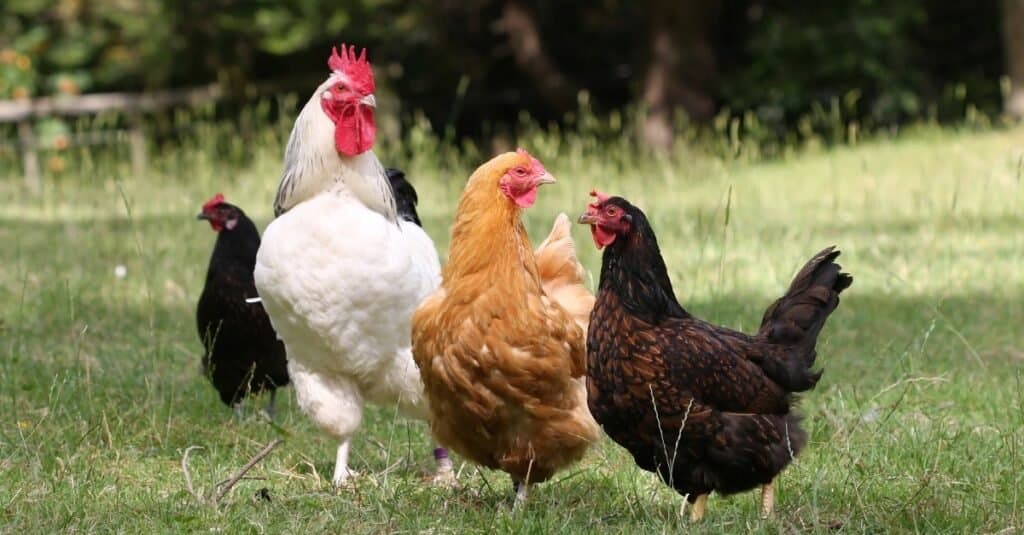
iStock.com/fotoshoota
The most common farm animals are chickens, and it’s no secret why: Most people eat chicken meat and eggs, and farmers and gardeners use chicken droppings as fertilizer, making them staple livestock to raise whether for self-sufficiency or for profit. Their temperament and the number of eggs the hens can lay a day depends on the breed.
Also, some people have them for pets. They eat feed, kitchen scraps, garden leftovers, and weeds, including chickweed, as well as garden pests. You’ll need to provide them with fresh water, a covered shelter in case of rain, fencing, a coop to nest and lay eggs with 4 square feet of space per hen, which you’ll need to keep clean, and regular health inspections.
It is most common to have hens, although the occasional rooster or two for crowing as well as to help protect hens from predators. Some examples of popular breeds are Silkie, Sumatra, and Australorp. Bantam chickens are ideal for people with small chicken coops in suburban backyards, and Welsummer chickens are petite, dual-purpose birds for meat and eggs. Orpingtons are also dual-purpose as well as great for pets.
Rabbits
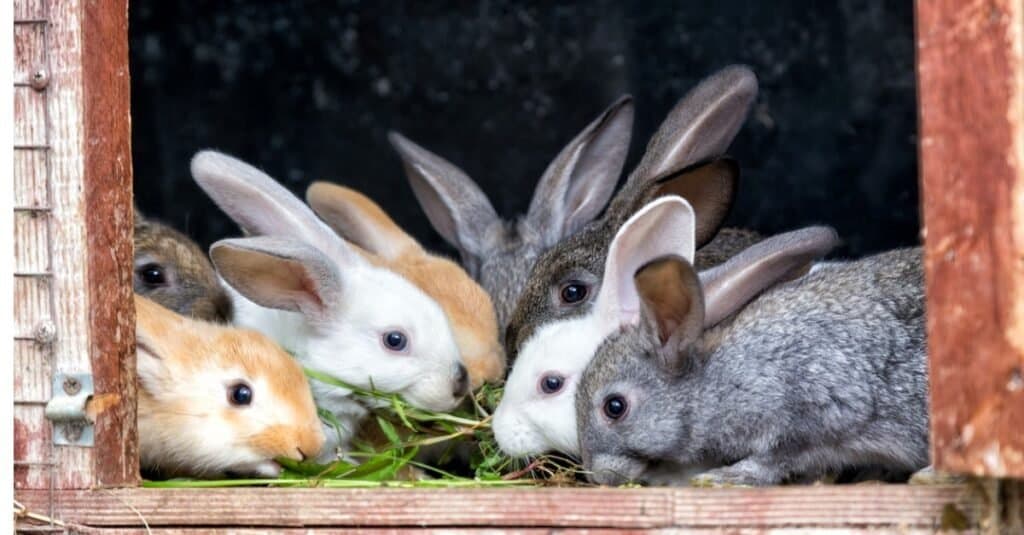
iStock.com/Laures
Rabbits are low maintenance Farm animals, even for beginners, and can thrive in a backyard where you can raise them for meat and pelts and use their droppings as fertilizer. They are excellent to raise for profit, for self-sufficiency, or for pets because they breed quickly. Females birth 6 or more in a litter and you can cull babies for meat at 8 weeks, while two does and one buck can produce 180lbs of meat in a year. The meat is lean but tasty. Rabbits are social animals and need companionship with at least one other rabbit or to live in a colony. You need a hutch for them and if they are free-range, a bunny tractor to protect them outside.
Pigs
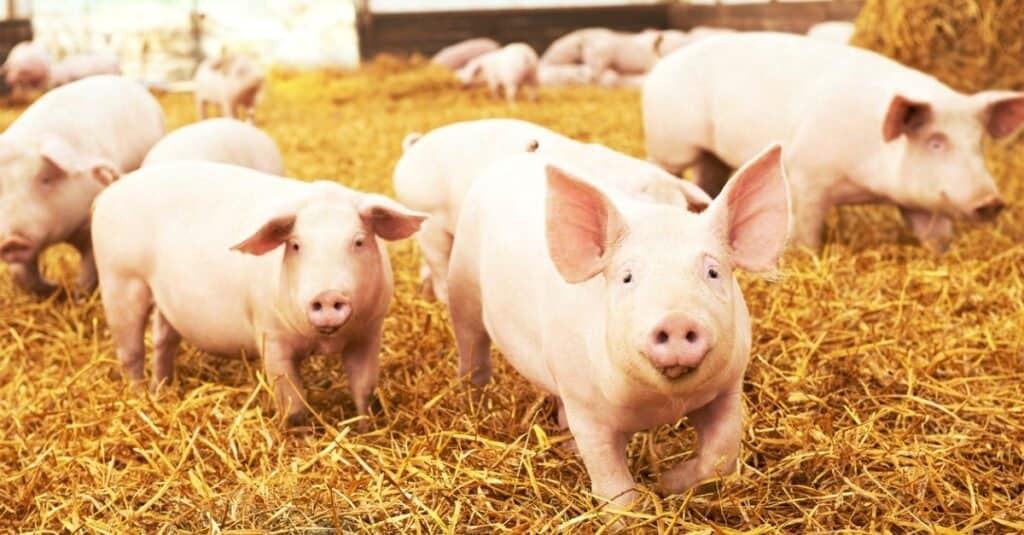
iStock.com/kadmy
One of the most common Farm animals for self-sufficiency and for profit, pigs are a great meat source. Sows can birth as many as 11 piglets in a litter, though they need a year before they can be culled. It is also popular to raise miniature breeds for pets. Pigs eat kitchen scraps, corn, grains, bread, and milk, which when combined we know as slop, as popularized by the book Charlotte’s Web.
While they have a large appetite and food costs can be expensive, you can cut down on the cost by allowing them free-range grazing. Doing so also lets them move around to maintain cleanliness. A pen with strong fencing is necessary so they can’t escape, although they can do well in a backyard and also need a pigsty. If you have a small farm, a Berkshire pig is an ideal breed. The Tamworth breed is prized for its bacon and all other cuts of pork as well as the sows’ large litters and being excellent mothers. Pigs are vulnerable to worms and other parasites and need careful handling to avoid being charged or bitten.
Sheep
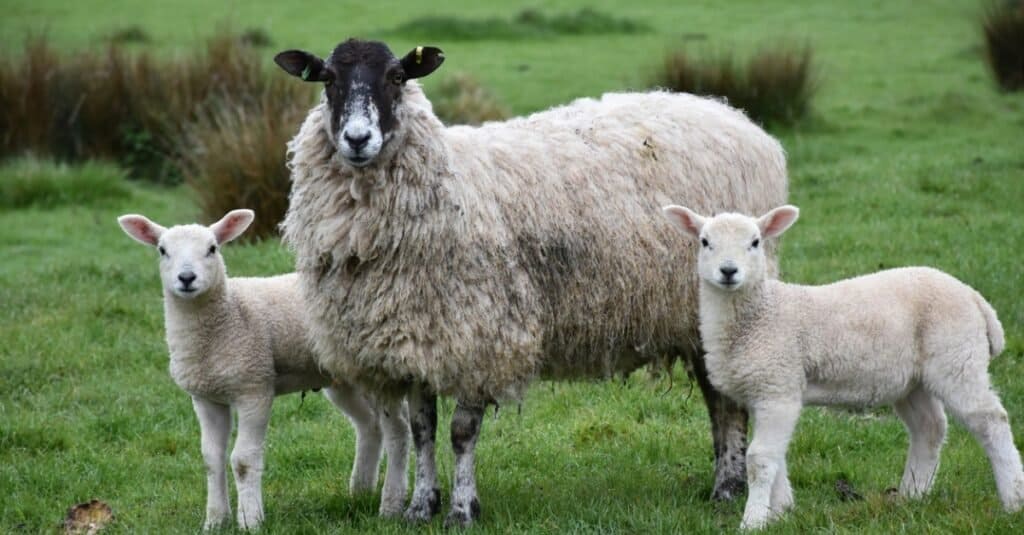
iStock.com/DejaVu Designs
Similar to goats in terms of being relatively low maintenance, sheep can suit different sizes of farms. They are also great for beginners. This livestock is appealing to raise for self-sufficiency and for profit in terms of providing meat, milk, and wool. Sheep milk is superior to both cow and goat milk for making cheese. Keeping one to three sheep in the same pasture means not needing much space. The Suffolk breed is equally useful for meat and wool, while the Blackberry is a hairless meat breed. The Miniature Cheviot is one of the UK’s hardiest breeds and is valued for its wool, and the East Friesian is the best dairy sheep.
Quails
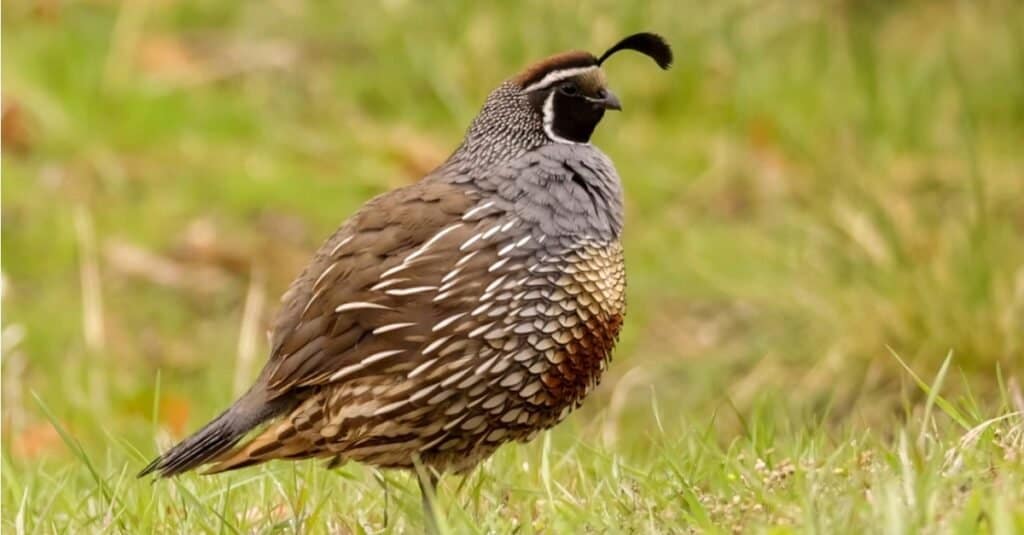
iStock.com/Banu R
Compared to guinea fowl, quails are more low maintenance because they are less noisy and need very little space, although they can’t free-range because they’ll escape. They are great to raise for profit and for self-sufficiency from their eggs and meat. For shelter, they need a covered enclosure, roosting areas, and brush. Their space needs to allow for 1 square foot per bird. For their food, you’ll need to give them protein supplements so they don’t become cannibalistic. You’ll want to keep them away from other birds, such as chickens or geese, to avoid injury and death. These birds are smaller than chickens but hens start laying eggs at 8 weeks and lay about one egg per day, with 3-4 eggs being equal to one chicken egg. The Coturnix breed is popular for backyard farmers.
Honeybees
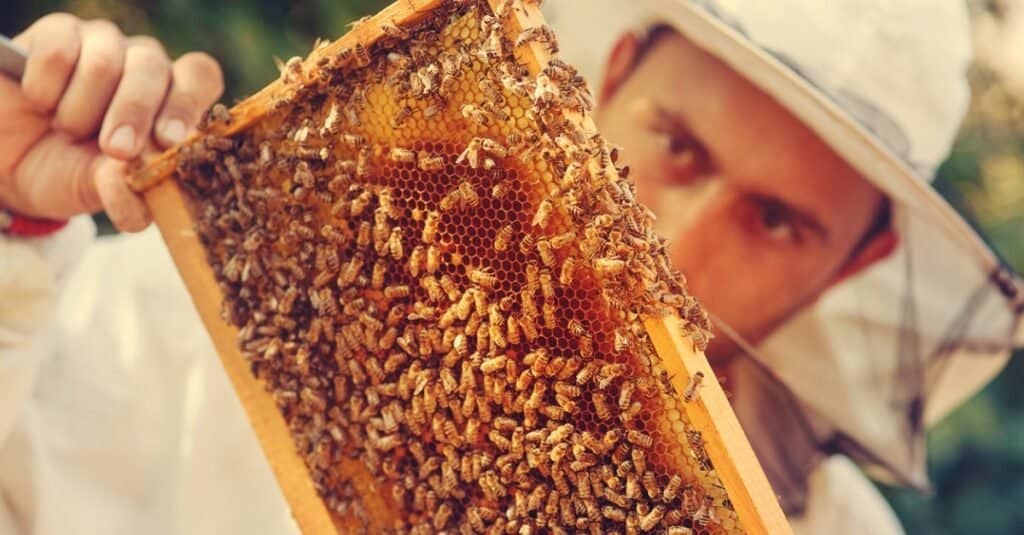
Honeybees are low maintenance Farm animals that can thrive in a backyard to raise for profit. Most people have them for making honey but they produce other popular products such as bee pollen, royal jelly, beeswax, and bee bread. You need only hive boxes and a water source. However, they are not for beginners, as they need watching during the winter, are sensitive to pesticides and other chemicals, and may need special handling such as for changing the queen or culling an aggressive hive. Also, they are vulnerable to bears and other predators for their honey or themselves as food, and handlers always need to wear bee suits.
Livestock Guardian/Herding Dogs
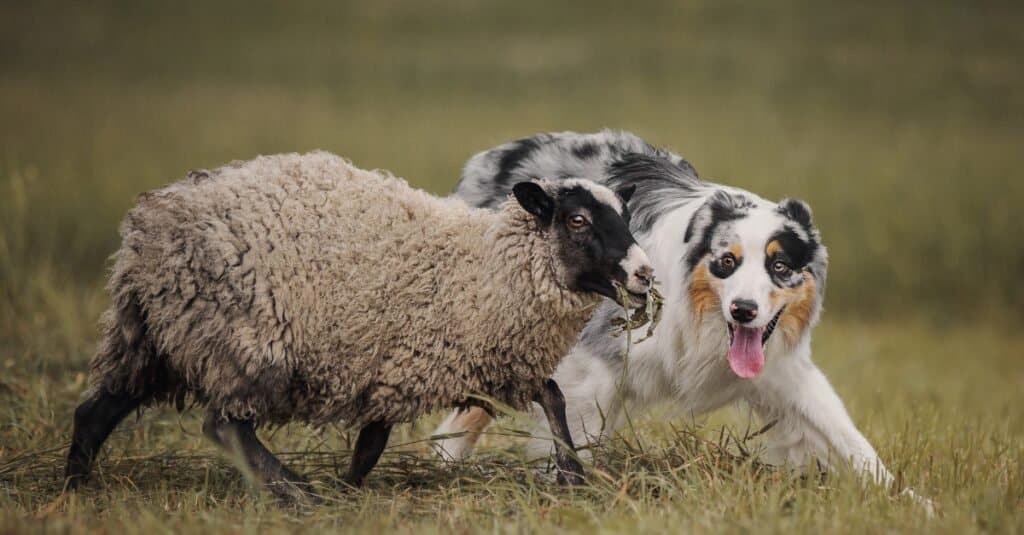
Man’s best friend is there to help you for self-sufficiency with herding any size of livestock and guarding and protecting them from predators, especially on several acres of land or a rural farm. They are also great for pets. However, they won’t do well on small farms, in a backyard, or in suburban areas near other people, and need fencing due to their wanderlust and independent streak. They also need proper training and so are not for beginners. While some dogs are only good for herding and others for guarding and protecting, some breeds can do it all. Some of the best herding and guard dogs for farms include the Great Pyrenees, Australian Shepherd, Maremma Sheepdog, Tibetan Mastiff, and Komondor.
Farm animals serve a variety of purposes. Whether you want to raise them for profit, for pets, or for self-sufficiency, there are Farm animals even for beginners that are low maintenance and even some that can comfortably fit in a backyard. These animals are most common as livestock for food, fiber, companion animals, or helpers to keep the farm running smoothly or pest-free.
Next Up: What Do Daddy Long Legs Eat? 10 Foods in Their Diet
More from A-Z Animals
When you’re creating a farm, you need to know about the most useful animals for that environment. Whether you’re looking for livestock or companion animals, there are many possibilities – for beginners, low maintenance, for self-sufficiency, for pets, to raise for profit or miniature animals for a backyard. Here are the 10 best farm animals around, with many being the most common.
Goats

iStock.com/aurorat
One of the best Farm animals to raise for self-sufficiency and for profit is goats. They are useful for meat, dairy, fiber, and clearing brush. Some people prefer goat dairy to cow dairy and it has its own unique health benefits, such as being easier to digest, especially for lactose-intolerant people. They need to eat feed, hay, shrubbery, and vegetables but are also happy to get rid of kitchen scraps. You need to provide them shelter, goat fencing, and have at least one other goat for companionship and to deter them from escaping.
They are not very low maintenance, however, as they are vulnerable to illness, stomach problems, and worms. If you have a small backyard or only a few acres of land, look into miniature breeds such as pygmy goats, useful for both meat and milk, or Nigerian dwarf goats, which are useful for milk and also most common for pets. Nigerian dwarf goats can produce 1/2 to 1 gallon of milk a day. There are goat breeds that are naturally hornless if you don’t want to dehorn them.
Ducks

iStock.com/kunchainub
The most low-maintenance Farm animals to raise are ducks, which don’t need much space compared to others. They are excellent to raise for self-sufficiency or for profit, even for beginners. Not only are they useful for meat if you enjoy duck, but the hens lay an average of 200-300 extra-large eggs a year starting at five to six months of age. Many people prefer duck eggs over chicken eggs for baking.
These foragers only need a house, a kiddie pool, and proper fencing, and even serve to help around in the garden by eating pests and weak-rooted plants. They also eat snails, worms, aquatic plants and bugs, fish and fish eggs, grains, and seeds, They’re great for pets, too. One caveat is that they are more territorial than chickens and each needs 4-6 feet of space in their house and 10-15 feet to roam in a duck run. The Pekin breed is an all-white duck that is valued for both eggs and meat, and it produces 90% of all duck meat.
Cows

iStock.com/DutchScenery
When it comes to raising livestock for profit or for self-sufficiency, you can’t do better than cows. You can sell calves once they’re weaned, or wait until they’re grown and sell them for meat and milk cows to produce and sell milk and other dairy products, such as butter and cheese. Miniature cattle breeds are especially low maintenance as they don’t need as much space, and even less so if you use rotational grazing, so you can have them in a suburban backyard. The Dexter cow is a smaller breed but still needs 1/2 acre to graze on if you don’t provide hay. A regular cow needs one acre to graze, two acres for rotational grazing. All cows need a water source, a barn for winter, and shade for summer while out on pasture. Owners must be careful when handling cows, whether they are bulls or cows protecting their calves.
Chickens

iStock.com/fotoshoota
The most common farm animals are chickens, and it’s no secret why: Most people eat chicken meat and eggs, and farmers and gardeners use chicken droppings as fertilizer, making them staple livestock to raise whether for self-sufficiency or for profit. Their temperament and the number of eggs the hens can lay a day depends on the breed.
Also, some people have them for pets. They eat feed, kitchen scraps, garden leftovers, and weeds, including chickweed, as well as garden pests. You’ll need to provide them with fresh water, a covered shelter in case of rain, fencing, a coop to nest and lay eggs with 4 square feet of space per hen, which you’ll need to keep clean, and regular health inspections.
It is most common to have hens, although the occasional rooster or two for crowing as well as to help protect hens from predators. Some examples of popular breeds are Silkie, Sumatra, and Australorp. Bantam chickens are ideal for people with small chicken coops in suburban backyards, and Welsummer chickens are petite, dual-purpose birds for meat and eggs. Orpingtons are also dual-purpose as well as great for pets.
Rabbits

iStock.com/Laures
Rabbits are low maintenance Farm animals, even for beginners, and can thrive in a backyard where you can raise them for meat and pelts and use their droppings as fertilizer. They are excellent to raise for profit, for self-sufficiency, or for pets because they breed quickly. Females birth 6 or more in a litter and you can cull babies for meat at 8 weeks, while two does and one buck can produce 180lbs of meat in a year. The meat is lean but tasty. Rabbits are social animals and need companionship with at least one other rabbit or to live in a colony. You need a hutch for them and if they are free-range, a bunny tractor to protect them outside.
Pigs

iStock.com/kadmy
One of the most common Farm animals for self-sufficiency and for profit, pigs are a great meat source. Sows can birth as many as 11 piglets in a litter, though they need a year before they can be culled. It is also popular to raise miniature breeds for pets. Pigs eat kitchen scraps, corn, grains, bread, and milk, which when combined we know as slop, as popularized by the book Charlotte’s Web.
While they have a large appetite and food costs can be expensive, you can cut down on the cost by allowing them free-range grazing. Doing so also lets them move around to maintain cleanliness. A pen with strong fencing is necessary so they can’t escape, although they can do well in a backyard and also need a pigsty. If you have a small farm, a Berkshire pig is an ideal breed. The Tamworth breed is prized for its bacon and all other cuts of pork as well as the sows’ large litters and being excellent mothers. Pigs are vulnerable to worms and other parasites and need careful handling to avoid being charged or bitten.
Sheep

iStock.com/DejaVu Designs
Similar to goats in terms of being relatively low maintenance, sheep can suit different sizes of farms. They are also great for beginners. This livestock is appealing to raise for self-sufficiency and for profit in terms of providing meat, milk, and wool. Sheep milk is superior to both cow and goat milk for making cheese. Keeping one to three sheep in the same pasture means not needing much space. The Suffolk breed is equally useful for meat and wool, while the Blackberry is a hairless meat breed. The Miniature Cheviot is one of the UK’s hardiest breeds and is valued for its wool, and the East Friesian is the best dairy sheep.
Quails

iStock.com/Banu R
Compared to guinea fowl, quails are more low maintenance because they are less noisy and need very little space, although they can’t free-range because they’ll escape. They are great to raise for profit and for self-sufficiency from their eggs and meat. For shelter, they need a covered enclosure, roosting areas, and brush. Their space needs to allow for 1 square foot per bird. For their food, you’ll need to give them protein supplements so they don’t become cannibalistic. You’ll want to keep them away from other birds, such as chickens or geese, to avoid injury and death. These birds are smaller than chickens but hens start laying eggs at 8 weeks and lay about one egg per day, with 3-4 eggs being equal to one chicken egg. The Coturnix breed is popular for backyard farmers.
Honeybees

Honeybees are low maintenance Farm animals that can thrive in a backyard to raise for profit. Most people have them for making honey but they produce other popular products such as bee pollen, royal jelly, beeswax, and bee bread. You need only hive boxes and a water source. However, they are not for beginners, as they need watching during the winter, are sensitive to pesticides and other chemicals, and may need special handling such as for changing the queen or culling an aggressive hive. Also, they are vulnerable to bears and other predators for their honey or themselves as food, and handlers always need to wear bee suits.
Livestock Guardian/Herding Dogs

Man’s best friend is there to help you for self-sufficiency with herding any size of livestock and guarding and protecting them from predators, especially on several acres of land or a rural farm. They are also great for pets. However, they won’t do well on small farms, in a backyard, or in suburban areas near other people, and need fencing due to their wanderlust and independent streak. They also need proper training and so are not for beginners. While some dogs are only good for herding and others for guarding and protecting, some breeds can do it all. Some of the best herding and guard dogs for farms include the Great Pyrenees, Australian Shepherd, Maremma Sheepdog, Tibetan Mastiff, and Komondor.
Farm animals serve a variety of purposes. Whether you want to raise them for profit, for pets, or for self-sufficiency, there are Farm animals even for beginners that are low maintenance and even some that can comfortably fit in a backyard. These animals are most common as livestock for food, fiber, companion animals, or helpers to keep the farm running smoothly or pest-free.
Next Up: What Do Daddy Long Legs Eat? 10 Foods in Their Diet



